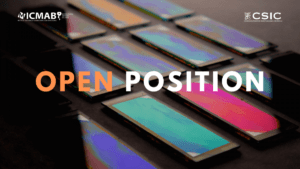The candidate will work on the project Improving solar cell efficiency by spectral matching and charge mobility enhancement (ISOSCELLES) within the framework of the Spanish R&D program “Generación de Conocimiento 2021”.

This project aims to fundamentally improve the efficiency of organic solar cells for different applications by unblocking the optical/electronic compromise, with two different approaches: the use of spectral splitting combined with multi-junction cells, pioneered by our group, and the use of mild operational temperatures for increasing charge carrier mobilities and thus the charge collection to ultimately boost fill factor (FF) and power conversion efficiency (PCE).
The underlying hypothesis of the project is that understanding and acting upon the optical/electronic compromise can be a game changer in the research of organic photovoltaics (OPV), leading to solar-cell-crafting for each envisioned application.
Several important tasks of this project involve the screening of a large number of possibilities regarding materials, geometries, spectral parameters, etc. For this, in our group, we have developed a high throughput method that enables the fast evaluation and optimization of materials, generating large amounts of date. We aim at coupling this big data to statistical tools (e.g. correlation factors) and AI models to analyze the data and obtain what are the features of importance, develop predicting models.
In this sense, the postdoctoral researcher to be hired should be able to aid us on these more advanced tasks. Moreover, we would expect this researcher to help in the programing of the light source, especially in the tasks related to dynamic variation of the spectrum while measuring the cell using minimization algorithms, such as genetic algorithms.

